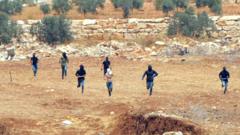The attack highlights ongoing conflicts between Israeli settlers and Palestinian farmers, amid rising violence in the region.
Israeli Settlers Launch Violent Attack on Palestinian Farm in West Bank

Israeli Settlers Launch Violent Attack on Palestinian Farm in West Bank
Masked settlers disrupt olive groves, escalating tensions in the occupied territory.
In a striking incident witnessed by BBC's Lucy Williamson in the occupied West Bank, a group of masked Israeli settlers aggressively descended upon Brahim Hamaiel's family olive farm, leaving destruction in their wake. The attack, unprovoked and swift, unfolded as Hamaiel shared the story of his ravaged olive trees, allegedly targeted by settlers from a nearby illegal outpost.
The Hamaiel family has nurtured olive trees on this ancestral land close to Turmus Aya for generations, making them a symbol of resistance against settler encroachment. Hamaiel expressed a profound connection to the land, stating, "Fear is natural... but there’s something stronger than fear. It’s the scent of my ancestors and the attachment that goes back hundreds of years." Yet, fear gripped the atmosphere when the settlers charged down the hillside with sticks in hand.
Local residents soon gathered, armed with stones and determination to protect their land as the dark plume of smoke from burning vegetation marked the site of the violence rising into the sky. Despite the presence of the Israeli army, who attempted to control the situation, it was reported that confrontations escalated with settlers allegedly attacking Palestinians claiming their right to defend their property.
As the chaos ensued, it became clear that similar incidents are becoming a regular occurrence for these communities. Settler aggression has surged since the onset of the recent conflict in Gaza, with Israeli organization Peace Now claiming an unprecedented rise in both outposts and violent settler behavior. The past few months alone have seen the establishment of around 100 new outposts, contributing to large-scale land seizures.
Tensions mounted further when Rifa Said Hamail, a local resident, was left helpless as her husband faced settlers alone. She lamented the lack of protection against the attackers, stating, "This is not a life... They have weapons, we have nothing."
Amidst the mount of destruction, the Israeli army denied access to volunteer emergency teams trying to help those injured during the violent clashes. Further adding to the tragedy, 18-year-old Hamdan Abu-Elaya was shot dead by Israeli forces under controversial circumstances later the same day, rekindling deep grief and anger within the community.
Funeral rituals turned into displays of defiance, with his family vowing to continue resisting the "criminal occupier." The ongoing violence and desperate pleas of the community leave a stark reflection on the relentless plight faced by Palestinians living in the shadow of ongoing settler expansion and military control, raising alarms about humanitarian consequences as the cycle of violence continues without a clear resolution in sight.
The Hamaiel family has nurtured olive trees on this ancestral land close to Turmus Aya for generations, making them a symbol of resistance against settler encroachment. Hamaiel expressed a profound connection to the land, stating, "Fear is natural... but there’s something stronger than fear. It’s the scent of my ancestors and the attachment that goes back hundreds of years." Yet, fear gripped the atmosphere when the settlers charged down the hillside with sticks in hand.
Local residents soon gathered, armed with stones and determination to protect their land as the dark plume of smoke from burning vegetation marked the site of the violence rising into the sky. Despite the presence of the Israeli army, who attempted to control the situation, it was reported that confrontations escalated with settlers allegedly attacking Palestinians claiming their right to defend their property.
As the chaos ensued, it became clear that similar incidents are becoming a regular occurrence for these communities. Settler aggression has surged since the onset of the recent conflict in Gaza, with Israeli organization Peace Now claiming an unprecedented rise in both outposts and violent settler behavior. The past few months alone have seen the establishment of around 100 new outposts, contributing to large-scale land seizures.
Tensions mounted further when Rifa Said Hamail, a local resident, was left helpless as her husband faced settlers alone. She lamented the lack of protection against the attackers, stating, "This is not a life... They have weapons, we have nothing."
Amidst the mount of destruction, the Israeli army denied access to volunteer emergency teams trying to help those injured during the violent clashes. Further adding to the tragedy, 18-year-old Hamdan Abu-Elaya was shot dead by Israeli forces under controversial circumstances later the same day, rekindling deep grief and anger within the community.
Funeral rituals turned into displays of defiance, with his family vowing to continue resisting the "criminal occupier." The ongoing violence and desperate pleas of the community leave a stark reflection on the relentless plight faced by Palestinians living in the shadow of ongoing settler expansion and military control, raising alarms about humanitarian consequences as the cycle of violence continues without a clear resolution in sight.




















